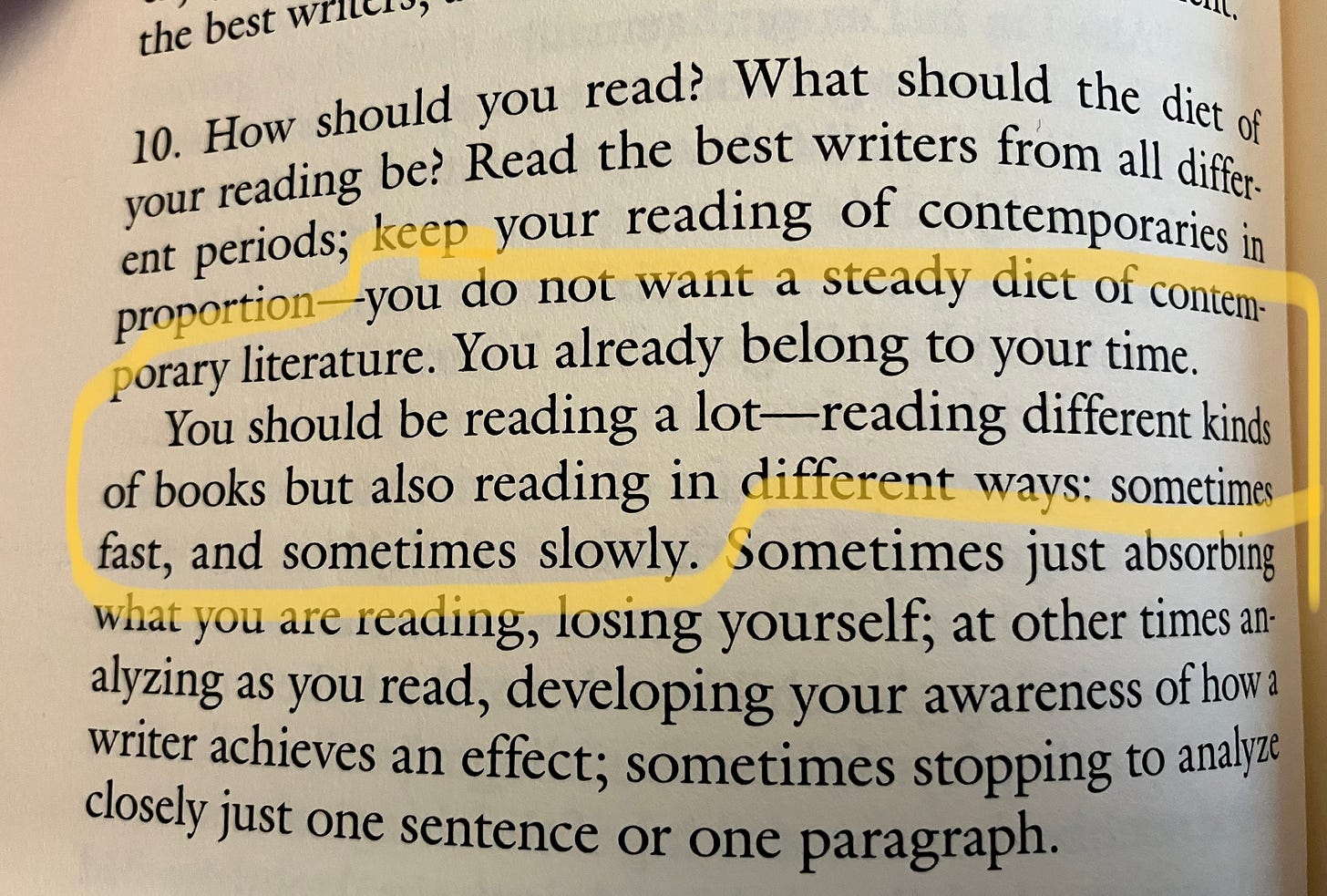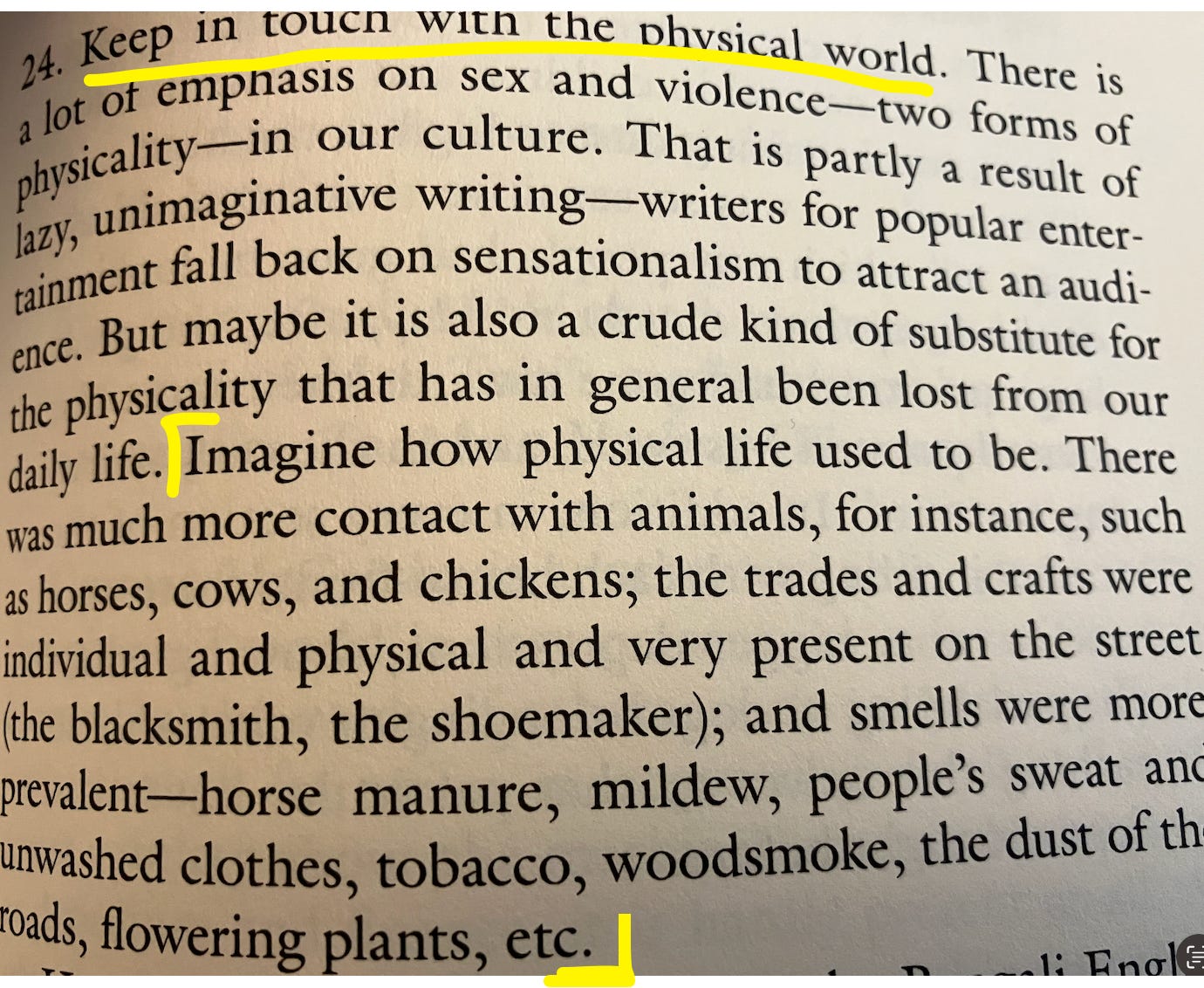30 recommendations for good writing habits
From National Book Award Winner & MacArthur Fellow, Lydia Davis
Hello to all the new readers out there 👋
I’m Josh Spilker and this is a newsletter for online writing, creativity, and culture.
I’ve orbited around this book of essays by Lydia Davis for a while and am now diving in.
If you don’t know who Lydia Davis is, just go to her MacArthur Fellow (Genius Grant!) page and start there.
She had an essay with 30 recommendations for good writing habits that I thought I would distill here.
Her listicle style isn’t perfect, and her headers weren’t great (lol). Most of the headers below are exact, a few I summarized. All others are direct quotes.
She even breaks down the points into a,b, and c in a few of the essays. She distilled a few of them here, at LitHub.
Ok, let’s go!
Take notes regularly
Always work (note, write) from your own interest, never from what you think you should be noting or writing
Be mostly self-taught
“I suggest working equally hard, throughout your life,” at learning new things on your own, from whatever sources seem most useful to you”
Revise notes constantly
If you take notes regularly…you can “grow” a story
Taking notes as you sit outside at a cafe table, you can also begin to develop a poem
Revise constantly
“Another advantage of revising constantly, regardless of whether you’re ever going to do anything more with what you’ve written, is that you practice, constantly reading with fresh eyes, reading as the person coming fresh to this never having seen it before”
Sentences or ideas reported from reality out of context can be wonderful
Go to primary sources and go to the great works to learn technique
Read the best writers from all different periods
“You do not want a steady diet of contemporary literature. You already belong to your time.”
Read in different ways
“When you aren’t inspired to work on whatever it is you should be working on, do an exercise, or a series of them. Make up your own (writing) exercises. Do them even if you feel dull and unimaginative.”
After a writing session, leave time to clear your head
“Do not go directly from writing to lunch with friends or to a class. Do not go straight to your emails or your phone. Leave at least fifteen minutes completely open.”
If you want to be original, don’t try to be original
“If you want to be original, cultivate yourself, enrich your mind, develop your empathy, your understanding of other human beings, and then, when you come to write, say what you think and feel, what you are moved to say.”
Write in private first, think before you automatically “censor” yourself
My note: this is in particular reference to memoir and potentially hurting people that you know. she suggests writing it first and then deciding before publishing it
Be patient; don’t rush your work or try to finish before you’re ready.
Work on your expertise with the technical aspects of writing English.
Learn as much as you can, as often as possible, about the origins of the words you’re using.
Pay attention to the sounds of the language.
Be sure to read poetry, regularly, whether you are a poet or a writer of prose.
“It is important for you to absorb, regularly, a poem’s concentrated attention to language, and its economy.”
Be curious — be curious about as much as possible
Free yourself of a device — Learn to be alone
“Learn to be alone, all alone, without people and without a device that is turned on. Learn to experience the purity of that kind of concentration.”
Say less rather than more
“Saying less rather than more, which sometimes means cutting some of what you have, can be very effective”
Cutting can be very effective
“It quickens the pace and involves more happening in a shorter space”
Keep in touch with the physical world
Dialogue
My note: She doesn’t say a lot here, only that it’s important and that writers like Grace Paley and Roddy Doyle are good at it
“Dialogue is an integral part of the interpersonal interactions…”
More dialogue: Listen to people talking and copy down the choicer bits of what you hear
“In this way, you will learn how people really speak.”
Observe the traits of complex people in particular
Learn at least one foreign language in your life
“…it will give you perspective on English and teach you more about English.”
Translate at least one piece of writing, no matter how short, in your life
My note: !!!
Maintain humility with regard to language and writing
My note: 🙏
Which points resonate with you?
For me, translating one piece of writing seems like a tall task. I can see how it would be helpful for understanding language.
So many people are telling us how devices are sucking our attention from the things that matter
I like #11, doing writing exercises to help our mind think about something else
I’m interested in your thoughts. Do share below!
More Things:
These are other books I’m reading1. In various states of progress:
The Fact of a Body by Alexandria Marazano-Lesnevich
(from the library, hardcover)
The Best Minds by Jonathan Rosen
(audiobook, on ch 2)
Orphaned Believers by Sara Billups
(from the library, paperback)
New York, New York, New York by Thomas Dyja
(audiobook, 1/4 of the way through?)
Trust by Hernan Diaz
(paperback, just bought this at the local bookstore)
Last Week
You're (probably) not taking advantage of the knowledge around you
I like to work at the library. It’s one of my favorite places to work.Thanks for reading Josh Spilker! Subscribe for free to receive new posts and support my work. It’s quiet and in my area, it’s not terribly busy. That’s a ton of books and information. Stories, yes, but also books on accounting, plants, cookbooks, and books about popular TV shows.
Last Things
“For one thing, it is hard for me to let a sentence stand if I see something wrong with it. Even when I’m writing a grocery list it is hard for me not to correct a misspelling.” — Lydia Davis
Keep going,
-Josh Spilker
Affiliate!





![Essays One by [Lydia Davis] Essays One by [Lydia Davis]](https://substackcdn.com/image/fetch/$s_!WXJ1!,w_1456,c_limit,f_auto,q_auto:good,fl_progressive:steep/https%3A%2F%2Fsubstack-post-media.s3.amazonaws.com%2Fpublic%2Fimages%2Fcd43e7c0-c276-4cbe-907c-c17e3123fc25_333x500.jpeg)





I totally disagree with this one: “When you aren’t inspired to work on whatever it is you should be working on, do an exercise, or a series of them. Make up your own (writing) exercises. Do them even if you feel dull and unimaginative.”
I have found advice like that pointless. It's as bad as advice to retype what you wrote the day before. It's drudgery. I want to feel at minimum interested and hopefully excited. If not, I shift gears entirely: go to the gym, walk the dogs, even clean out a closet--anything that doesn't involve words.
Maybe her point works for some people, but I don't see that as a good habit, I see that as a barely-disguised "should" and we writers get enough of that from way too many sources.